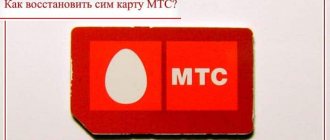As a rule, a SIM card without a passport is purchased by those who have not yet turned 18 years old, migrants, or those citizens who, for one reason or another, want to hide their data. Such a lively trade in “gray” SIM cards is in full swing at many metro stations or train stations. To buy a telephone card, you don’t need to show your passport, you just need to pay the required amount to the merchant and that’s it, the new number is already in your pocket.
The sale of “left” SIM cards may threaten the safety of Russian citizens. This is once again confirmed by the terrorist attacks committed in various regions of the country. Terrorists communicate using illegal numbers, and mobile phones are also used to detonate improvised explosive devices. Since 2018, the sale of SIM cards without a passport has been prohibited and is therefore punishable by various penalties.
Where and who sells SIM cards without a passport
Today, a SIM card from almost any mobile operator can be purchased without going through communication shops. To do this, those who wish can seek help from persons who often stand at metro stations, train stations or bus stops. In their hands, as a rule, they have a stack of boxes in which the “left” SIM cards are located. But here we should not forget that such a sale is illegal and carries with it various kinds of liability.
But not everything is as simple as it might seem. For example, having given a certain “Samvel” 200 rubles, a citizen becomes the owner of a brand new mobile number, with a tariff, for example, “All for 300” from the mobile operator Beeline. At least that's what it says on the box that was given to the buyer. The client’s account will contain 50 rubles; there is no need to activate the SIM card before use. However, the first catch awaits here, since there is no such tariff on the official website of the Beeline company. You can find out the tariff using your personal account by registering on the website of the cellular company.
A SIM card received without a passport simply cannot be completely anonymous, since it is still registered to someone, but it is issued. As a rule, the scheme is as follows: a fictitious legal entity is created that buys and registers a package of SIM cards. These cards are then issued to dealers, that is, those who distribute and sell them at metro stations. In fact, it turns out the following: the citizen who purchased such a card is not its owner, since it is issued to a third party. Therefore, you need to be prepared for the fact that money from a SIM card can be written off by the true owner of the SIM card upon application, and it can also be blocked at any time. However, this outcome of events does not bother either side.
How scammers obtain passport data
Several times, while passing by, I personally saw people giving their passports to those handing out SIM cards at the crossing. Of course, there is a possibility that this is really a promotion from the telecom operator, but such a probability is very small to take such a risk.
It will be much more likely that attackers will simply obtain your passport data, which they can then successfully use for completely different purposes - from replenishing their database with current passport data, which is then used for advertising purposes, to obtaining your home address and even a loan for your Name.
Of course, this is an extreme case, but this is already enough to doubt the correctness of contacting such people. Especially given the fact that communication shops are now at every turn and you can go there.
How to avoid becoming a victim of deception or scammers?
You must purchase a SIM card only from a mobile operator, having previously drawn up a service agreement . Thus, the buyer's rights will be protected. Here, the cellular operator itself is responsible for the safety of personal and personal data, so if you purchase a SIM card on the street, there is no guarantee that the owner’s data will not be publicly available online.
Manipulating the sale of SIM cards without registration is illegal, and resellers (sellers) must be held accountable.
This type of business flourishes, most often, in large cities. However, SIM cards without registration can now be found in almost any city in Russia . Ads of this kind can also be found on various websites that are popular among residents. In order not to run into problems with the law, you should not buy “fraudulent” SIM cards on the street. There are specialized cellular communication stores for these purposes.
Access to personal information
If you happen to take a free SIM card and start using it as your main one, the consequences can be even more unpleasant. By restoring access to your number and blocking it for you, the real owner will be able to get to the accounts on social networks and instant messengers that you have already linked. Needless to say, you can find a bunch of personal information there and use it for not the best purposes, ranging from blackmail to leaking business correspondence to competitors.
On topic: 600 minutes, SMS and unlimited Internet for 200 rubles in the new MTS tariff
What restrictions do SIM cards without documents have? Myths about “left” SIM cards
Many naively believe that by purchasing a “gray” SIM card they will become the owners of the same set of options and services as other subscribers . In fact, anonymous SIM cards are already registered to another person, most often to a fictitious organization, so many services are simply not available for use. possible to restore the SIM card , since it does not belong to you. Also, owners of anonymous phone numbers cannot use the promised payment service. One more point regarding linking a virtual bank card - this will not work.
On the Internet you can find several myths regarding SIM cards without documents, which can be easily dispelled:
- Most residents think that funds from such cards flow away like water in an unknown direction . All this is nonsense, because until recently, mobile operators received enormous profits from such subscribers, so it makes no sense for them to steal money from the client’s account.
- “Free” SIM cards contain a virus. This can only be believed by someone who doesn’t understand how cellular communications work at all. A virus is a malicious program that creates copies of itself and spreads to other devices, so it cannot get into a SIM card in any way, much less harm a cell phone.
- Once you bought a “left” SIM card, get ready to lose all your money on bank cards . Perhaps this is the most common “horror story” associated with such cards. However, no one understands how it is possible to steal money from a bank card from a person who bought a SIM card without documents.
Virtual SIM cards: how, why and why
Not long ago, engineers began to think: why do we need a SIM card at all, if it is, in fact, just a secure data storage plus a computing device that is simple by today’s standards? After all, exactly the same data storage can be implemented in the device itself. Then, at a minimum, there will be no need to produce these same SIM cards, sell them, replace them if lost or damaged - why is all this?
But then we will get the same thing that was in the DAMPS or CDMA-800 networks - programmable phones. And one of the advantages of the GSM standard over them is precisely that it is an “untethered” standard. That is, you just need to insert your SIM card into the device - and it immediately becomes individual: you don’t have to go anywhere, flash anything, and so on.
However, this was good and convenient in those days when the subscriber, as a rule, had one SIM card for all needs. Today, devices with two or three SIM cards are in use, and there are also tablets, modems, and so on. Some subscribers keep several SIM cards just for data transfer - say, because different operators have different coverage in different places. And, of course, roaming. It’s worth mentioning separately.
We talk about how SIM cards are designed. Part one: history of the issue - https://t.co/CmqxlC4HgI pic.twitter.com/cHldz8cyxm
— Kaspersky Lab (@Kaspersky_ru) December 16, 2015
What does a modern traveler do when he arrives in an unfamiliar country? That's right, he buys a local SIM card for data transfer. Why not use roaming? That's right, because it's expensive and completely pointless. After all, the idea of roaming is to be able to keep your phone number for voice calls while being served abroad on a foreign network. But there is absolutely no need to save the number to transfer data - it has absolutely no value, which is why everyone buys local SIM cards.
But this is very inconvenient - you need to study all the tariffs and conditions, often in an unfamiliar language, then find a working point of sale and explain there what you want, and then somehow top up your account.
We continue to talk about how SIM cards are designed. This time about clones: https://t.co/sPmyxgksYh pic.twitter.com/PbBMAXifeN
— Kaspersky Lab (@Kaspersky_ru) January 19, 2016
And in Russia there is a Euroset on every corner, and I can tell you a story in the style of a “Bachelor Party in Vegas” about how we went to some suburb of San Diego to pick up a SIM card from a local virtual operator, and then tried to activate it. Or about Greece, where to the nearest communication salon you need to walk 10 kilometers uphill (or, if you have a lot of money, take a taxi), and this salon is open a couple of days a week, and only a couple of hours before the afternoon rest and a couple of hours after him.
In general, there are few conveniences in buying a new SIM card, including for the operator: after all, he bears the full cost of connecting a new subscriber (production of starter packages, logistics, service, etc.), and you use this SIM card a couple of weeks at most.
It seems that SIM cards in their current form are living out their last years, and here's why: https://t.co/uh300FEiQM pic.twitter.com/u6o7De06HZ
— Kaspersky Lab (@Kaspersky_ru) February 24, 2016
That's why they came up with virtual SIM cards. The idea is very simple: the device has a protected memory area, similar to that in a SIM card, but data is loaded into it via a radio channel, that is, all the same identifiers, the correspondence of which is stored by the operator in the HLR database, are received by the phone via an encrypted communication channel and … All!
Consider that you bought a SIM card in a salon, only it flew to you “by air.” Almost the same as instead of buying an album on disc in a store, downloading it from iTunes.
Technically, everything is implemented very simply. In order not to make a fuss, the SIM card itself, in the sense of a smart card in the appropriate form factor, remains with us - but it’s just a blank in which initially there is no data and, most importantly, some areas can be overwritten.
This feature, in particular, is supported in new iPad models - you can buy an Apple SIM blank for them and write the data of a particular operator onto it. For the US and UK, local tariffs are supported, and for other countries, for example, the GigSky “tourist” SIM card is supported.
Its tariffs, however, are still rather close to roaming rates and are not very attractive, but the technology itself is in its infancy - it will be possible to bring it to fruition only when Apple itself comes to an agreement with operators around the world. Microsoft is also launching a similar project (the Cellular Data application is already available in the Windows Store).
Cellular news: https://t.co/RDNFLOjLoA. Microsoft is preparing to release its own SIM card. pic.twitter.com/Mlb2nzo3KM
— GeekTimes (@GeekTimes_ru) January 10, 2016
Google, in turn, has Project Fi, however, it works a little differently (and so far only in the USA): the device can automatically connect to the best network, that is, in fact, it is a virtual operator working on the basis of two national base networks at once networks. However, Project Fi subscribers can use the Internet in 120 countries around the world under almost the same conditions, namely with a speed limit. True, this project is in its infancy, although it no longer works only by invitation.
Intelligence represented by the Wall Street Journal reported that the mobile operator Google will start working tomorrow. https://t.co/XODQhkB4Ub pic.twitter.com/EcfKulIku9
— GeekTimes (@GeekTimes_ru) April 22, 2015
Another initiative in this direction is VSCA (Virtual SIM Card Alliance), a cloud-based service for managing virtual SIM cards, based on the Remote SIM Provisioning specification adopted by GSMA in 2014. Both operators that have their own virtual SIM card profiles and aggregators, which can be manufacturers of subscriber devices, travel agencies, and so on, can connect to it. A virtual SIM card for each country can be purchased through a mobile application, and the “blank” itself will be sold in the same way as now - in an offline store.
5G cellular networks: how they will work, why they are needed and when they will be available - https://t.co/27iaXMktJE pic.twitter.com/wnkjiuaos9
— Kaspersky Lab (@Kaspersky_ru) May 22, 2015
The issue again comes down to partnerships with operators, but they are not yet very willing to participate in such projects. First, they don't want to lose increased data roaming revenue. And secondly, they are afraid of becoming not just a “pipe” to the Internet, but a completely “faceless pipe” - without the opportunity to engage in marketing and, in fact, throwing their far from cheap trademark into the trash.
In addition, there is a lot of talk about the prospects of Local Breakout - in LTE networks, data roaming will work in the same way as Internet access for “your” subscriber, without routing through the home network, which will significantly reduce its cost. However, this is a completely different story, and the near future seems to belong to eSIM - virtual SIM cards that no longer require the use of a “blank card”, but are loaded directly into the device’s memory.
How to check the region in which the SIM card was registered
Finding out who has a SIM card is not so easy today, because mobile operators cannot distribute passport and personal data of their clients. However, there are some services that can easily determine in which region the SIM card was issued:
- in any search engine you can specify a phone number, for example, if someone called you from an unfamiliar number, after which the system will automatically display information in which region the SIM card was purchased;
- you can use the widget from Yandex;
Today there are a large number of services for determining the place of registration of a number, however, here you should not leave any information about yourself, for example, passport data, since this information easily leaks to the “black” market.
In order to combat the spread of “gray” SIM cards, additions to the existing law were adopted. The procedure for selling cell numbers has been significantly tightened. These amendments came into force in 2021, so you can purchase a SIM card in a mobile phone store only upon presentation of an identification document, that is, a passport. If the operator discovers that a number has been sold without documents, then the mobile operator must immediately block such a mobile number. Therefore, now SIM cards on the “black” market are already issued on other people’s passports, or on fictitious organizations.
Who distributes
It's worth starting the conversation about free SIM cards with an important distinction. Official representatives of the mobile operator can also distribute such SIM cards free of charge. This is a completely legal activity, because the cost of SIM cards is not regulated in any way by law, but subsequent registration with passport details is mandatory. That is, you can use a regular number only after it is activated and registered with the operator. And if the free SIM card is registered in your name, then you can’t expect any tricks from it. Enjoy it for your health.
Another thing is when you are given a free SIM card, you insert it into your phone and find that it works right away. This may seem convenient to some - you can, for example, create new accounts on social networks and other places that require confirmation via SMS. But we don’t recommend you do this, even if the person who issued the SIM card was wearing a branded T-shirt from a well-known mobile operator. And the reasons for this are as follows.
An alternative way to refuse a Beeline SIM card remotely
The decision you make to terminate your relationship with Beeline may be associated with a switch to another telecom operator. This is where the simplest and most unexpected answer on how to do this will be. If you have not yet connected to another telecom operator, then you can keep your old number.
To become a subscriber of another mobile operator with the same number, you do not need to give up your Beeline SIM card. You don’t even have to notify the Beeline provider about your decision. The transition procedure is completely left in the hands of the cellular operators themselves. If you decide to switch to another operator and keep the number, then the steps are as follows:
- Select the operator you want to switch to.
- Contact the nearest office of the selected provider and indicate your desire to make the transition with your number. As an alternative, most operators allow you to submit an application for transfer remotely on their Internet resources.
- You will be given a temporary SIM card, to which the number from Beeline will be transferred in the future, and after connecting to the new operator, you can simply destroy the old SIM card from Beeline.
As you can see, in order to refuse a Beeline SIM card, you don’t always need to go crazy and contact the provider to terminate the contract. By the way, if you are moving to another city and do not have time to visit the office at your old place of residence, you can submit an application to refuse a SIM card at any time remotely. The Beeline website has all the necessary information and sample applications.










